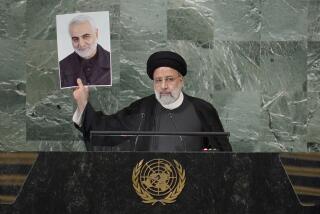U.S. Moves Cautiously as Iraqis Thwart U.N. Inspection Team
- Share via
WASHINGTON — As Iraq carried out its threat to block an American-led United Nations arms inspection team, the Clinton administration struggled Tuesday to balance diplomacy with the threat of force, hoping to be firm enough to cause Iraqi President Saddam Hussein to back down without frightening off key U.S. allies such as Russia and France.
“This is ‘steady as she goes’ diplomacy, diplomacy designed to keep the Security Council together as we address this recent obstruction by Saddam Hussein,” White House Press Secretary Mike McCurry told reporters.
Administration officials insisted that President Clinton retains the option of using military force--with allies, if possible, or without them, if necessary--but emphasized that armed action was a last resort.
In Baghdad, Iraqi authorities thwarted the inspection team headed by Scott Ritter, 36, a former U.S. Marine, by failing to assign escorts to guide inspectors past security guards, as is required by U.N. procedures. After waiting for half an hour, Ritter and his colleagues returned to their hotel; other U.N. teams proceeded as scheduled.
At U.N. headquarters in New York, Richard Butler, head of the U.N. special commission charged with dismantling Iraq’s weapons of mass destruction, said he chose not to let the inspectors work without Iraqi escorts because of concern for their “safety and security.”
Butler urged the Security Council to demand that Iraq cooperate with all arms inspection teams, regardless of their composition.
Alain Dejammet, the French ambassador to the U.N. and this month’s Security Council president, said the council will adopt a strong statement of support for the arms inspectors “as soon as possible,” probably today.
Butler plans to visit Baghdad next week to press an earlier demand for access to all suspected arms sites, including those that Iraq has declared off limits because they are located in Hussein’s private preserves. Butler also will demand--with the likely unanimous backing of the council--that Iraq end its latest obstructionist tactics.
Although some council members, such as France and Russia, have expressed impatience with the sanctions imposed on Baghdad by the U.N. after Iraq invaded Kuwait in 1990 and have called for lifting them soon, Hussein’s challenge to U.N. authority has unified the council against him.
The administration sought to preserve that unity by moving cautiously in its response to the latest Iraqi provocation. “The Security Council has hung together as it has addressed [Hussein’s] previous obstructions,” McCurry said. “We are going to work hard in the Security Council to make sure that they continue to hang together.”
Still, administration officials were stung by criticism that the emphasis on diplomacy has let Hussein get away with thumbing his nose at the United States and the U.N. Even if Hussein relents, these critics say, the dispute will have given the Baghdad regime more time to hide its weapons facilities.
To counter those arguments, the administration insisted that it would use force if other methods prove inadequate. The Pentagon announced that the aircraft carrier Independence will sail soon from the western Pacific to the Persian Gulf to relieve the Nimitz.
Although the rotation does not increase the overall strength of U.S. forces in the region, it puts fresh personnel on station. Since a similar crisis in November, the Pentagon has maintained a potent military force of two carrier groups and more than 20,000 personnel in the area.
In Kuala Lumpur, the Malaysian capital, Defense Secretary William S. Cohen said the United States will continue to pursue diplomatic efforts until they are exhausted. He said there were no plans to increase U.S. forces in the region because “we have a very robust presence there. It is more than sufficient to take any action should any action be necessary.”
Other officials made clear that the administration was a long way away from ordering unilateral military action. “Putting the armed forces of the United States gravely at risk is the most awesome responsibility a commander in chief has,” McCurry said, using the president’s military title. “And this commander in chief will do so [only] after he has explored all other options.”
Secretary of State Madeleine Albright said the U.N. must insist on “unconditional access” for all of its inspectors.
In a speech to the Center for National Policy, a think tank she once headed, Albright said Congress’ failure to appropriate money to pay U.S. back dues to the United Nations has undercut Washington’s leadership there. “Failure to pay our U.N. debts undermines our leverage, just as Saddam Hussein is challenging the authority of the United Nations,” she said.
Asked if she was blaming Congress for the crisis, Albright said: “I hold Saddam Hussein responsible for defying the U.N. What I do hold Congress, or a few members of Congress, responsible for is a lack of understanding of the importance that the United Nations plays in our lives, and specifically the role that the United Nations is playing in terms of assuring that Saddam Hussein lives up to his obligations.”
More to Read
Sign up for Essential California
The most important California stories and recommendations in your inbox every morning.
You may occasionally receive promotional content from the Los Angeles Times.













